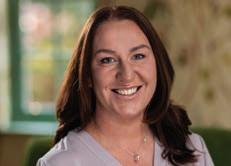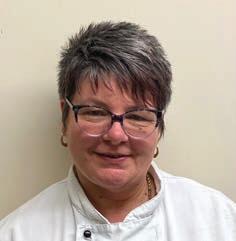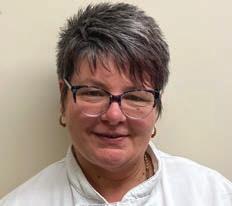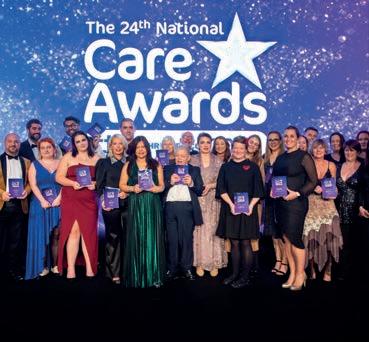










Chief executive officer
Alex Dampier
Chief operating officer
Sarah Hyman
Executive assistant
Kirsty Parks
Editor-in-chief
Lee Peart
Features editor
Charlotte Goddard
Subeditor
Charles Wheeldon
Advertising & event sales director
Caroline Bowern 0797 4643292 caroline.bowern@nexusgroup.co.uk
Business development manager
Steven Godleman steven.godleman@nexusgroup.co.uk

Business development researcher
Robert Drummond
Event operations manager
Carly McGowan
Operations executive
Sophia Chimonas
Senior conference producer
Teresa Zargouni
Head of digital content
Alice Jones
Marketing design manager
Craig Williams
Marketing campaign manager
Sean Sutton
CRM database manager
Annalisa La Manna
Lead developer
Jason Hobbs
Publisher
Harry Hyman
Investor Publishing Ltd, 5th Floor, Greener House, 66-68 Haymarket, London, SW1Y 4RF Tel: 020 7104 2000
Website: caring-times.co.uk
With public inquiries on the Covid pandemic under way in England and Scotland, it’s high time for a day of reckoning on the appalling neglect of care homes and the elderly during the crisis.
A new independent website has begun to gather evidence from the Scottish public on their experiences of Covid as part of a public inquiry.
A recent report by the Nuffield Trust and London School of Economics made damning reading on how the first four months of the pandemic (February to May 2020) were mismanaged by government, cataloguing how a lack of visibility of social care, unclear accountability, insecure funding and poor workforce pay and conditions affected its ability to implement protective measures in a timely way.
The report found the fragmented nature of the system and a shortage of civil servants working on social care contributed to confusion over who was responsible for decisions and implementation in the Covid response, which, for example, undermined the effective distribution of PPE and testing for care staff.
Key findings from the report included: the exclusion of the sector from pandemic planning exercises and failure to take action to address problems identified where the sector was included; lack of access to Covid testing and sick pay for staff when self-isolation policies were in place, especially for those on zero-hours contracts; many providers of care, often small businesses, entering the pandemic with little or no cash reserves due to a lack
of long-term funding support; and delays in emergency funding reaching the front line with extensions frequently announced with only weeks, days, or in one case, hours before the end of the scheme.
We all witnessed for ourselves how care homes and care home staff were appallingly neglected and left on their own during the early days of the pandemic despite claims of a “ring of steel” of protection.
Shockingly, 25,000 people were discharged by hospitals into care homes without being tested between March and April 2020.
Former health secretary Matt Hancock recently faced allegations that he ignored medical advice to Covid-test all care home entrants in April 2020 with government advice on testing not being published until August 2020.
There were 43,256 deaths involving Covid-19 in care homes in England between March 2020 and January 2022, according to the Office for National Statistics. Of these, more than 17,000 died between April and August 2020 when the government was still dithering.
A day of reckoning is long overdue on the shocking neglect of care homes and the elderly during the pandemic, with people held to account and lessons learnt.
Cast iron commitments should be made in law to ensure such neglect and wanton loss of life can never occur again.
Lee Peart Editor-in-chief Caring TimesScottish Care warned the failure of talks to agree new care home fees could lead to a “huge” number of care home closures. The stark warning came after the representative body and local government body COSLA failed to agree new fee and pay levels for the National Care Home Contract.
A new website launched to gather the Scottish public’s experience of the Covid pandemic. Let’s Be Heard: Sharing Scotland’s Covid Experience is the main channel for people affected by the Covid-19 pandemic in Scotland between 1 January 2020 and 31 December 2022 to share their experiences as part of the Covid Inquiry
A care provider was ordered to pay £200,000 at Northamptonshire Magistrates’ Court after it failed to protect residents from avoidable risk during the Covid pandemic. Amicura, which operated the now closed Temple Court Care Home in Kettering, was fined £120,000 and ordered to pay £80,000 costs to the Care Quality Commission.

Ireland, a large privately owned care home operator in Northern Ireland. The plans will see the expansion of Healthcare Ireland’s Northern Ireland portfolio to more than 40, from 25 currently, with the creation of up to 950 jobs, as well as developing sites across the rest of the UK and Ireland.
The number of registered nurses, midwives and nursing associates grew by 30,351 to 788,638 in 2022, according to the Nursing and Midwifery Council. There were a record 52,148 new joiners in 2022, almost half of whom were educated overseas.
Agency nurses are paying £125 a week rent to live at a Guernsey care home because of a lack of staff accommodation to meet demand. In January the States of Guernsey took over responsibility for running the home in Saumarez Park from its previous owner in order to secure its long-term future.
Jeremy Richardson stepped down as group chief executive of Runwood Homes after less than a year in the role. Richardson, previously chief executive of Four Seasons Health Care and brighterkind, took up the post in July last year. Runwood Homes’ founder and owner, Gordon Sanders, previously chairman of the group, replaced Richardson.

English housing charity Abbeyfield began consultation on the closure of Abbeyfield House in Tettenhall, Wolverhampton. The sheltered housing service, which was renovated in the 1990s, comprises seven studio flats and one larger flat. Abbeyfield confirmed it was also considering the future of two other neighbouring Abbeyfield House services.
US investment company Welltower is investing in the expansion of Healthcare

Chief financial officer Amanda Holgate has been appointed to Anchor’s board. Holgate, who was appointed in February, has worked in the housing sector for more than eight years with recent roles including chief financial officer at Southern Housing Group. She was also deputy finance director at Family Mosaic and director of finance services at Peabody, two companies that subsequently merged their operations.

Richard Lain-Smith, head of marketing Black Swan Care Group, explains how the company has earned a reputation for its turnaround service
Black Swan Care Group was founded in 1991 as a business consultancy for the care sector, primarily instructed to give advice to UK banks, before purchasing its first care home, Nightingale Lodge in Hunstanton, Norfolk, close to the Royal Estate at Sandringham in 1994.
Since then, the group has grown across East Anglia, now managing an estate of 22 care homes. Eighteen of the homes provide care and support for older people, including support for people living with dementia, while the remaining four support adults with physical or learning disabilities. In all, the group is registered to support more than 700 people, with over 800 staff employed across the homes.
Following the recent inspection at
“The story of the improvements at Beccles Care Home is not a one-off, however; Black Swan has earned an industry reputation for its turnaround service.”
Care homes
Norfolk: 10 homes (Norwich (4), King’s Lynn, Hunstanton, Dereham (2), Great Yarmouth, East Harling)
Essex: 7 homes (one in Silver End, a village between Witham and Braintree, and 5 along the coast in Clacton, Walton on the Naze and Frinton- on-Sea)
Cambridgeshire: 3 homes (Chatteris, Gamlingay, Melbourn)
Beccles, Suffolk
Boston, Lincolnshire
its newest home, Beccles Care Home in Suffolk, resulting in an overall Good result, the group can boast that all its homes are rated as Good or Outstanding with the Care Quality Commission. Three homes are rated as Outstanding overall and six have Outstanding elements within their inspection reports.
Black Swan acquired Beccles Care Home last December, inheriting its previous Inadequate CQC rating. It was reinspected in March and given a Good rating in all areas. It was able to turn the home around thanks to a full review of the service, significant investment and renovations at the home, along with intensive training and support for the staff led by the home’s registered manager, Davina Button.
The story of the improvements at Beccles Care Home is not a one-off, however; Black Swan has earned an industry reputation for its turnaround service.
Managing director Tom Lyons explains: “We have been purchasing and providing consultancy for care homes for over 20 years, specialising in turning around poorly performing homes. Our specialist team, including ex-CQC inspectors, brings together a multitude of experience, expertise and contacts. It also allows us to

Care type
Older people’s care, dementia care and adults with learning disabilities
Older people’s care, adults with physical and learning disabilities
Older people’s care
Older people’s care
Older people’s care
deploy the right people for the right job.
“We strongly believe that good finances and regulatory compliance go hand-in-hand, so our approach is generally to audit the care home for regulatory compliance before focusing on both areas. Our audits cover all areas of compliance, including medication, care plans, recruitment, health and safety, infection control, fire, food hygiene and staff practice.
“In addition, we have really good working relationships with the Care Quality Commission, local authority quality assurance teams, safeguarding teams, environmental health, infection control and fire services.
“We work with individual operators as well as small groups who are looking to satisfy regulators rapidly, be it the Care Quality Commission or the local authority. Our turnaround services are bespoke and designed around individuals and their needs.
“We are always happy to invest in homes where we can see that there is an opportunity for us.”
The group has a clear commitment to providing a working environment where people can achieve their career goals, learn new skills and strive for a career in social care.
“We believe that our staff deserve to be rewarded with fair and reasonable pay, reflecting the skilled work that they do. We’re fully committed to giving our staff a wage that meets everyday needs and sits above the statutory government minimum wages.”
With the well-documented challenges for recruitment and retention in social care, there are opportunities for volunteers, regular placement vacancies for healthcare students and varied job opportunities in all areas of the company.
The group is committed to providing the Real Living Wage to all its employees. From 1 April, all staff have been paid at least the Real Living Wage of £10.90 an hour – which sits above the statutory Minimum and National Living
Wages. Over 55% of staff earn in excess of this amount.
Lyons explains: “We believe that our staff deserve to be rewarded with fair and reasonable pay, reflecting the skilled work that they do. We’re fully committed to giving our staff a wage that meets everyday needs and sits above the statutory government minimum wages.”
As well as this commitment, Black Swan’s employment package includes paid breaks, free meals (staff are encouraged to dine with residents), a fully paid induction and training programme, ongoing mandatory and specialised training, internal promotion opportunities and apprenticeship schemes.
Additional benefits include paid-for Disclosure and Barring Service checks, access to the Blue Light Card discount scheme, a ‘Refer a friend’ scheme, access to wages throughout the month via a Wagestream scheme, plus a 24/7, 365 employee care line with confidential telephone counselling.
Black Swan’s youngest care home manager Chloe Boon, manager at The
Beeches in East Harling, Norfolk is a product of the progression scheme. Now aged just 24, Boon started with Black Swan in September 2016 as an apprentice care assistant aged just 17.

“I’d never done care before and felt welcomed into the home and discovered the role of a carer,” Boon said. “I then moved over to the activities co-ordinator role, before becoming a senior care assistant. In 2018 the opportunity came to become a trainee deputy manager. I learned so much valuable knowledge in that role and in 2019 I progressed to deputy manager.
“Alongside my experience in my previous roles, Black Swan supported me with my Level 3 and 5 diplomas in health and social care to further my knowledge, and I then became a peripatetic deputy manager, where I developed wider experience of other Black Swan homes and teams.
“When the opportunity came up for the manager’s role at The Beeches, I knew that the time was right for me and I’m really excited to be joining our Outstanding-rated team at the home. I’m so grateful for the support I have been given throughout my career with Black Swan.”
Townsend Communications’ managing director, William Walter, meets Care England’s policy team to learn about how it’s transforming the organisation’s efforts to inform policymaking and champion its members’ needs externally
Formed in April last year following the departure of both Care England’s director of policy and external affairs advisor, the organisation’s dedicated policy unit represents a significant step change in the body’s approach to thought leadership and external engagement.
Despite its relative infancy, the team hasn’t been hanging around. Led by George Appleton (and reporting to chief executive, Professor Martin Green), it has already notched up some impressive wins. In May last year the policy unit played a crucial role in Care England’s successful efforts to lobby for an 11.5% uplift for 2022-23 for Funded Nursing Care as well as a backdated Covid payment for the period 2021-22.
More recently, the team instigated the second round of the Care England Energy Tender aimed at reducing energy costs for care providers across the country.
As our interview begins, I’m struck by the enthusiasm and diversity of the youthful team. The team of six come from a broad range of backgrounds ranging from Parliament and academia to working with children with SEND. Yet, despite their diverse backgrounds, it’s obvious they’re all united by a genuine passion and enthusiasm for their work and social care more broadly.
Head of the policy team, Appleton, emphasises how the sector is “at its heart, a human sector often made up of some of society’s most vulnerable”. Despite this, he says, “the sector is often not given the societal or political attention that it deserves or requires”.
Their work helps to address this. Senior policy officer Abigail Moir explains how, driven by the needs of its members, Care England’s work is to support providers to reduce their costs and ensure sustainability for the sector. The policy unit’s work feeds into this.
Policy manager Louis Holmes breaks down the team’s work into five main strategies or streams: delivering sustainable funding for the sector; ensuring fair and sustainable pay levels for care workers as well as appropriate training and career paths; facilitating the digital transformation of the sector; ensuring proportionate regulation; and, lastly, making sure its members have a voice in guiding the strategic integration of health and social care services.
Policy officer Charlotte Lezard talks about how the team's work is both “reactive” and “proactive”. Its reactive work, she says, “is to ensure that the voice of care providers is heard within the debate when stories arise”. Meanwhile, their proactive work “is focused on ensuring that the sector remains a top priority not just on the political agenda, but also in the media”.
“We keep a strong presence on social media, such as our LinkedIn and Twitter, we speak at conferences, we write articles and columns for the sector trade press and we do television and radio to highlight important issues,” she explains.
The organisation also channels significant resources into generating original research reports. Ioan Bishop, Parliamentary affairs officer, tells me how its recent findings published in the ‘Sector pulse check’ report, produced in partnership with the charity Hft, provided a “snapshot of the finances and workforce of the adult social care sector”.
He adds that “the project revealed that one-third of providers, including nearly half of smaller organisations, considered exiting the market in 2022 as a result of the financial pressures facing the sector”.
Despite the findings the study uncovered, he remains positive that it will offer a “blueprint for reform” to help alleviate the challenges facing the sector. The report has been well received, with the group recently hosting a round table with the All-Party Parliamentary Group on Adult Social Care, led by Damian Green MP, to discuss the implications of

"The sector is often not given the societal or government reaction that it deserves or requires"
“Care England has recently launched an integrated care system membership to drive conversations between social care providers and their healthcare colleagues.”

the findings.
Our research discussion segways into the importance of data to the team’s work. Despite the sector being data rich, data collection and analysis in adult social care is not without its difficulties, they tell me.
Care England has previously emphasised the importance of collecting data to get meaningful results. But, as Appleton notes, “central mechanisms” have been shown to be “flawed” as “adult social care providers put data into a system but often never receive anything back”.
Holmes says “better collection and use of data could have a significant positive impact, particularly in terms of wellbeing and care models at an individual level”.
The group has also been involved in the advancements of a ‘capacity tracker’, as well as a ‘national minimum data set’ working alongside the Department for Health and Social Care to help progress data collection.
One of the sector’s main struggles is funding, and therefore most of the research that care providers produce is funding-related. Care England uses its market intelligence system MINT to identify the critical funding issues that providers face.
Policy officer Fraser Rickatson discusses how the portal “hosts important financial data within the sector, including both historical and current fee rates for every local authority across older persons and learning disability sectors”.
“An example of utilising this data was our Fair Cost of Care Analysis, where we identified that local authorities in England were underfunding older persons residential and nursing care homes by over £2 billion per annum during 2021 and 2022”, he says.
The group was able to use this analysis to identify the areas of concern for a regional and local approach to support not just its members, but the whole sector.
Promising progress is also being made
in terms of data and artificial intelligence. Holmes reports on the “natural language processing” of AI to understand someone with severe learning disabilities, which the Care Quality Commission has also shown interest in. It has allowed for a growing “understanding of pain within communication for those who don't necessarily have the capabilities to display it in a ‘typical’ way”.
Additionally, this technology has the potential to complement current models of care for residents with severe dementia.
Appleton adds: “Care England has recently launched an integrated care system membership to drive conversations between social care providers and their healthcare colleagues. The running of regional round tables to foster relationships has helped to facilitate the objective of a collaborative sector.”
We discuss the future direction of the policy team and I’m told that this will follow the needs of Care England and, ultimately, its members.
As our interview concludes, I’m impressed with the energy and focus the team has. I anticipate it will play a crucial role in informing policymaking for the sector both in the lead up to the general election and beyond.
KYN opened its first 86-bed care home in Bickley, Bromley in Kent in February and has further sites in Central and Greater London in construction and planning.
Founded by real estate investor, Melford Capital, in 2019, following a personal experience of one of the partners, the business has spent the past four years compiling its head office team from both within and outside social care.
“We have had the luxury of time to work on the vision for KYN, how we can bring that vision to life, and to seek out the best people from care, as well from other complementary industries such as hospitality in order to provide the very best experience for our residents and their families,” Naidoo says.
“Providing the best care has to be about the team and the people. We have deliberately widened our talent pool to outside the sector. Our hospitality director worked in some of the best London hotels and our head of HR also came from hospitality where they have had to think really hard about recruitment, onboarding and benefits in order to keep staff in the current climate.”
Fees are priced competitively within the local market and take into account expensive land values and high-quality build and design costs. KYN has appointed Nina Campbell to design the interiors across all their homes.

“We are transparent with our fees and want to make what can be a very difficult time as straightforward as possible,” Naidoo notes.
“Our fees are all-inclusive with rooms rates varying according to size and facilities and our care fees are calculated pre-assessment so that we can tell people what they will be paying upfront.”
At KYN Bickley weekly room fees start from £1,850 and care packages £250. Fees include services such as hairdressing, spa treatments and physiotherapy and unlimited dining and beverages along with some dining with loved ones, as well as a concierge service.
Naidoo highlighted KYN does not charge deposits and joining fees or any after-death fees.
“It’s such a sensitive time, it doesn’t seem right to us to charge after-death fees,” Naidoo explains. “The last day the resident is with us is the last day the family pays for.”
A nurse by trade, Naidoo has worked in care for 29 years, including senior roles at Priory, Four Seasons Health Care and Barchester Healthcare.
Naidoo says getting it right from the start had been a new challenge. “With the experience that I have had, I have always thought about what I would do
if I set up my own business, so this has been a great opportunity to do that,” Naidoo says.
Naidoo has led on implementing KYN’s six core values during the recruitment and onboarding process, which are: make it personal, see the whole, inspire joy, find the positive, think harder, and be courageous.
“We work and live by our values,” Naidoo explains. “It’s essential for us to build a strong and clear culture throughout the business, led by our executive team.
“We have established a strong lessonslearned culture. We are a new start-up so we know that we will make some mistakes along the way, but with a very open culture right through the business we can learn and improve and make our residents’ and team members’ lives better.
“For example, we recently consulted with team members from our new home and asked them how we could make the recruitment and onboarding process better. They came up with some brilliant ideas. The process really empowered
“We are transparent with our fees and want to make what can be a very difficult time as straightforward a s possible.”Caroline Naidoo
the team and helped make us a better business.
“We have always been about very personalised experiences right from the outset,” Naidoo says. “We wanted to think differently about every element of the care home experience, taking inspiration from within the industry but also further afield.
"The focus for KYN is to provide the best-quality care and services in all areas, including food and nutrition and our specialist nutritionist ensures that menus support residents’ immunity and wellbeing. Our nutritionist and the kitchen team are overseen by director of hospitality who drives our high-quality service delivery.
“For us, it's not just about great service and great food, but the emphasis is on choice,” Naidoo explains. “We offer three choices per course at lunch and dinner from a daily changing menu, across a variety of settings. Residents can enjoy a meal socially in our Great Room, or in any of our lounges and dining areas. Alternatively, if they prefer to eat in their room or enjoy a cup of tea on their personal patio, they can.”
KYN’s teams are paid the London Living Wage and above, with salaries benchmarked against competitors.
“Pay and benefits are important, but people are attracted by our culture and the other ways in which we value and recognise our staff,” Naidoo says.
“What’s important to people these days is healthcare, wellbeing and flexibility.”
Training and development and providing career pathways is also a key focus. KYN partners with Worcester University on dementia training and has recently graduated a team of mental health first aiders from all parts of the business. Career pathways and job development grades are also offered to all employees.
“Every role has a professional and personal development pathway,” Naidoo says.
Given the plethora of luxury care home providers appearing on the market, Caring Times wanted to know what made KYN different?
“It’s about residents living their lives as they wish to,” Naidoo says. “We want to provide as much independence and choice as they prefer. We are very much resident-led. They feed into the lifeenrichment and wellbeing programme, the books on our bookshelves, and the menus the kitchen creates. We don’t have set mealtimes. You don’t come into our care home and live by our rules; we want people to live the lifestyle they are used to and want to.
“We have a dedicated hospitality team so that the care team can focus on meeting the residents’ needs in terms of wellbeing and life enrichment.”


The care provider also boasts a fully integrated IT software system.
“From the point that someone contacts us and makes an enquiry, that profile can be carried through to the pre-assessment stage, then onto the care planning system and interdependency tool which is, in turn, reflected on the staff rota and the medication administration, as well as our PainChek facial recognition system,” Naidoo explains.
“We have really great data analytics, so at the touch of a button I can see what’s going on in the business. I can see if someone has had a fall and how their care plan has been updated for that and I can review trends and analysis to support clinical governance.
“Our integrated system also prevents duplication and gives staff more time to spend with residents.”
Further innovative technology includes an acoustic monitoring system which maps a resident’s normal algorithms at night so that staff can be alerted to any changes in activity to
provide support and prevent falls.
“It really helps the team to get to know the routine of their residents at night and prevents having to do night checks so that residents are less disturbed and have the opportunity for a better night’s sleep,” Naidoo says.
In addition, a cutting-edge infrared monitoring system tells if someone has moved off their bed. The system can be used for people who don’t want to be listened to through acoustic monitoring or can be used in conjunction with acoustic monitoring to provide additional falls and care support.
While KYN pioneers use of state-ofthe-art technology, Naidoo stresses the need to maintain the ‘human touch’ in care: “We use tech to enhance the quality of the time we can spend with our residents’,” she says. “We also use that time to get to really know the real them. For example, we use our ‘My LifeStory’ to document residents’ life histories and interests on pre-admission, but also we build upon that as our relationships deepen and we learn more.
“From this our team can build a package of care as well as a bespoke life enriching and wellbeing programme. For example, we had a gentleman in the other day who was really interested in his family tree, so we got a genealogist in to get him started on that.
“We have also had a historian in recently to talk to a resident and have developed strong links with the local Rotary Club and Bowls Club as well as the local nursery for multi-generational
Looking ahead, KYN plans to open a 32-bed care home in Hurlingham, Southwest London in March next year with a further 50-bed home set to open in Kensington in early 2025.

“We have further sites in Hampstead currently going through planning,” Naidoo says. “Availability of sites with the space that we want is one of the main challenges of operating in London.
“Gaining planning permission is also a challenge. You have got to be very considerate to neighbours. We like to develop relationships and build trust within the local community during the build process, but that can take time.”
Naidoo adds KYN’s primary target area would remain Central and Greater London.
“There’s just not the facilities for older people who want to stay in London and we have the backing to do it,” the managing director highlights, while noting that “sparce” local competition is growing.
“We intend to grow at a rate of hopefully one or two homes a year over the next few years,” Naidoo concludes.
“The whole team is really excited and proud of what we are doing and so happy with how our Bickley home has been welcomed into the sector and the community and we are really excited for London as well.”
Being a prime mover means KYN is already one step ahead of its rivals in the race to capitalise on London’s potentially lucrative luxury care home market.
“We like to develop relationships and build trust within the local community during the build process, but that can take time."KYN Bickley

Jordan Rundle, director, healthcare development and investment, and Rob Kinsman, regional director, care, at Christie & Co assess whether the care home market is shrinking or evolving

New research by CSI Market Intelligence, ‘Say hello wave goodbye 2022’, revealed that, in England last year, 123 care homes opened against 247 closures, with a net loss of 230 beds – indicating that the care home market for older people in England shrank for the first time in three years in 2022.

The research also noted that care home openings last year were 23% down on openings in 2021, and were the lowest since 2015. There was a 1.3% market increase through openings, against a 2.6% decrease through closures. This is much in line with the average number of care home openings and closures since 2015 when CSI Market Intelligence began its reporting.
CSI also states that there were only two regions that gained beds across the year: London and the West Midlands, while the largest number of losses were in the Southeast, Southwest and Northwest.
“But many residential care homes that are solely dependent on local authority referrals are no longer receiving the levels of referrals to maintain occupancy levels."
It’s quite normal for care homes to close and new ones to open, but it’s the scale at which this happens and the number of closures versus openings that’s key. Despite the reported increase in closures, they only made up 13% of our sales in 2022, 80% of which remained as intended care use and are expected to be re-registered. So, yes, homes are closing, but many are being registered with the Care Quality Commission and CIW and are reopening with care use, which is an important thing to note.
Key reasons why homes are closing:
• The fallout from the pandemic has put the sector under pressure, with increased utility bills, increased staff costs, and the squeezing of margins, which have all created the perfect storm for providers, resulting in a number of closures across the UK.
• During the pandemic, the CQC was unable to inspect care settings but, now that we’re moving back into normality, the CQC regulators are toughening again, and many of these homes are being downgraded to Inadequate, which inevitably puts pressure on the financial viability of the business.
• Patient needs have become a lot more complex, with many clients requiring specialist nursing and/or dementia care. The average length of stay was also reduced. Many of the smaller, older properties aren’t equipped to cater to this more challenging client group, which is where the greatest demand is. Many councils prefer to keep people in
their own homes and provide domiciliary packages. This trend varies from region to region, but many residential care homes that are solely dependent on local authority referrals are no longer receiving the levels of referrals to maintain occupancy levels.
With an ageing population comes an increased demand for specialist care homes that cater to residents with dementia, Parkinson’s and other complex needs. For owners of both new and existing care homes, investing in futureproof assets to be able to cater to the changing client profile is key.
UK-wide analysis from the Christie & Co consultancy team reveals that, despite an overall loss of elderly care homes last
year, from January 2022 to January 2023, the market gained 1,851 beds, therefore suggesting we’re losing small homes and introducing larger new build assets. In these 12 months, we lost 6,369 beds due to de-registrations, 61% of which were in converted homes with an average size of 28 beds. In the same period, 8,090 beds were introduced to the market, 91% of which were in purpose-built homes with an overall average size of 54 beds.
Due to a significant rise in construction costs over the past 18 months, we are now seeing a trend of both developers and operators increasing the density of new build developments to benefit from economies of scale and improving overall viability for schemes. The average-sized development scheme Christie & Co sold in 2022 was about 68 beds and many new build developments are now in excess of 70 beds.
The emergence of new developments in place of older homes has been happening for a long time and isn’t a new trend, but it has been exacerbated by the pandemic. The underlying business case for new beds to meet increasing bed demand is not going anywhere and it is easier to incorporate the latest infection control measures into new schemes rather than trying to retrofit them into existing converted assets. The majority of investors and capital partners are seeking modern purpose-built real estate assets to achieve the highest Environmental Social and Governance credentials and move towards net zero.
Considering the increasing forecast bed demand due to the ageing demographic, there is expected to be a material undersupply of market-standard beds at a national level over the next decade. If you’re investing in the sector, the fundamental underpinning due to the shortage of market-standard bed supply underlines the long-term requirement for purpose-built operational real estate to meet the growing needs of the population.
Construction cost inflation is a major challenge for the whole sector, and if suitable private fee levels cannot be sustained, the economics and viability for new build development simply don’t work.
At the moment, there are more new care homes being built in affluent areas and less development activity in more marginal regions.
The West Midlands is one of the most densely populated areas in the UK outside London, so provides a strong underpin regarding bed demand and staffing availability. The Midlands has also seen one of the highest percentage increases in annual house price growth over the past few years, thus unlocking the viability of the region for purposebuilt development.
The underlying property values and scarcity of land in London means there has been a lot of competition for
development opportunities, from a broad range of residential and commercial uses. As the wider economy has softened and post-pandemic work/life trends have emerged, some of these competing uses have become less attractive which has increased the opportunity for care-related uses to step in. London has the strongest demographics in the UK when it comes to population depth and undersupply of market-standard beds, and we expect increasing development activity inside the M25 over the next decade.
The Southeast has some of the strongest underlying demographics when considering depth of affluence and population density, and has seen the most development activity in recent years as a consequence. In areas such as the Southeast and Southwest, there is generally good demand for residential developments, and so older Victorian care homes that are no longer fit for purpose are closing and being repurposed. The Southwest region, in particular, provides a very compelling opportunity for new build care homes benefiting from an ageing demographic and very limited new build competition. It takes time for the planning and construction process to unfold, but we do expect this trend to continue over the medium-term and first movers into such regions are likely to benefit.
For more information, contact: jordan.rundle@christie.com / 07711 767 180 or rob.kinsman@christie.com / 07717 335 367

In our ongoing series, Aaron White, head of business services and sustainability at Oakland Care, shares small but effective changes that care homes can implement to become more sustainable. This month he focuses on greener activities

Enabling residents to contribute to the sustainable improvements you make as a home is a must. Many residents will want to take part in an activity that helps reduce waste and increase biodiversity, or even learn more about sustainable initiatives in the local area.
Introducing greener activities into your schedule doesn’t need to have a cost implication. Rather than hiring a singer who has been to the home many times before, why not use the money to fund something a bit different? Instead of doing the standard activity on the plan for Wednesday afternoon, think about whether there’s something alternative that helps promote sustainability in the home.
Some residents enjoy making things that will be used in the garden. At Oakland Care we have had successful sessions creating bird-feeders out of bottles, or a wormery from an old medication box. As always, all ideas are shared on our green committee and replicated in other homes. At one of our homes the residents even helped with the installation of a beehive.
Getting outside into the fresh air and interacting with nature is always great for health and wellbeing. Residents can sprinkle a few seeds, or even just watch

and enjoy the session. When residents are part of the journey, it makes everything more meaningful.
Guest speakers are another great way to bring variety and education into the home. Rather than the standard ‘Elvis’ singer you might book every week, get someone in from the Wildlife Trust or the Forestry Commission to talk about local tree planting or biodiversity projects.
Think about introducing a newspaper recycling station on each floor of the care home. In one of our homes, residents are engaged and help collect and process the recyclables such as newspapers, if they would like to and are able. It’s enjoyable and seen as a valuable contribution.
Separating recycling and generally living in a green way is becoming the normal thing to do at home, or at least it should be, and of course we want residents to live as they would at home, as much as possible.
To improve your activity schedule further, think about introducing a themed ‘green day’ in the care home, where the focus of the whole day’s activities is on sustainability. Activities and decorations can be green-themed, food for lunch might be vegan or from a local sustainable store, and the whole day aims to raise awareness of sustainability
– as well as being fun. It doesn’t need to cost anything, just an alternative to activities you would be running anyway, and a green day can spark further ideas for activities to take place throughout the year.
At Oakland Care, our own green day in September 2020 morphed into ‘green week’ the following year, and now the whole of September is ‘greener month’.
Residents are often as keen as the team members to be more sustainable and we all need to work together to move forward, by creating a culture throughout that really cares.
“Getting outside into the fresh air and interacting with nature is always great for health and wellbeing. Residents can sprinkle a few seeds, or even just watch and enjoy the session. When residents are part of the journey, it makes everything more meaningful."
“We understand any negative impact of our activities on the environment and we strive to make a positive contribution in reducing it and support people to do the same.”
Well, do you?
The above statement is not a pious hope, nor a bland statement of intent. It’s what each and every social care provider subject to regulation by the Care Quality Commission will be required to demonstrate soon.
The new Adult Social Care Single Assessment Framework being introduced this year, introduces the new ‘Environmental sustainability –sustainable development’ criteria to the inspection regime. This is a massive step forward, putting environmental sustainability at the heart of what it means to provide a social care service in which the public can trust.
The new criterion builds on a range of related aspects of the current inspection regime that touch on the wider sustainability agenda. The current regime already tests aspects such as workforce equity and inclusion (W1.9), community engagement (W3.2), fairness and transparency (W1.2), and ensuring staff are supported, respected and valued (W1.3). Many of these aspects carry through to the new Single Assessment Framework, particularly in the new ‘Shared direction and culture’ element. But this is the first time that adult social care providers will be asked explicitly about environmental sustainability as
part of the inspection regime.
This is, I am sure, just a first step in sustainability moving to the mainstream of how social care provision is assessed. Increasingly, commissioners are asking providers to demonstrate their sustainability credentials in tender exercise. Much of this to date has, frankly, been rather a tick-box exercise. Providers have been able to get away with bland statements of their commitment to sustainability so that commissioners can trumpet their environmental credentials – without really having much effect or impact. But this is changing. I have seen increasingly demanding asks of providers in commissioning tenders on sustainability requirements and with this element becoming far more important in tender evaluations. And this is only going to increase in importance.
We only have to look to the NHS to see what’s likely to be coming to the social care sector on this issue. The new NHS contractual requirements for healthcare providers now place very clear contractual obligations on providers around carbon reporting. As of now, all large NHS contracts require carbon reduction plans for suppliers’ emissions. In 2024, this will apply to all procurements in the NHS. And, in 2027, all suppliers will be required to publicly report targets, emissions and publish a carbon reduction plan for global emissions aligned to the NHS net zero target, for all their Scope 1, 2 and 3 emissions.
This is undoubtedly good news for the many of us committed to ensuring the social care sector plays its part in building a more sustainable future for future generations. But (there’s always a but), I do have concerns about the new inspection framework’s inclusion of sustainability criteria. Those concerns centre on the capability of the sector to tackle these issues and, crucially, CQC inspectors’ understanding of sustainability issues to make an informed assessment on these matters.

As far as I am aware, expertise in environmental sustainability issues has
not traditionally been a core competence expected of CQC inspectors. Expertise in the sector itself is growing but is still relatively nascent. So, if all of us are to ensure the new environmental sustainability inspection focus drives meaningful advances in how we deliver against the pressing carbon reduction challenges we face, there must be a rapid upskilling on these issues. There must also be intelligent, mature and open discussion between the CQC and providers in the sector to add depth, integrity and realism in the inspection framework on this vital agenda. Only in that way will we all be able to use this important change to move away from box ticking to meaningful change to address the climate change challenge.
That all being said, the bottom line is that all providers need to be looking now at their approach to environmental sustainability. In the words of the CQC guidance: “Be prepared to demonstrate what you are doing to reduce the impact on your environment and how you are incorporating renewable energy, sustainable transport, and environmentally friendly waste management into your day-to-day working.”
The inescapable conclusion is that social care providers need to get on board the sustainability train quickly as it is very much leaving the station.
“The inescapable conclusion is that social care providers need to get on board the sustainability train quickly as it is very much leaving the station."
Complaints should typically be made in writing to the person you have been dealing with at the CQC. Where that is not appropriate or may lead to a perverse outcome (where the person you are contacting is the subject of the complaint, for example), then you should submit your complaint to the CQC National Customer Service Centre, which will pass it on to the national complaints team.
When submitting your complaint, be sure to set out your grievances clearly and include supporting evidence.
Any complaint should be made within a year of when you first become aware of the issues relating to the complaint.
A complaint is appropriate if your grievance concerns any of the following issues:
• The conduct of staff or people working for CQC
• Administrative mistakes
• Unprofessional or inappropriate behaviours
• Failures to follow policies and procedures.
Alternative avenues for redress need to be used otherwise. Some of the most used routes for challenging CQC decisions include:
• Factual accuracy checks – used to challenge the factual accuracy of draft CQC reports
• Ratings reviews – used to challenge the validity of CQC ratings
• Representations and appeals to the First Tier Tribunal – used to challenge enforcement action.
The decision by the CQC to introduce mandatory specified routes for redress (dependent on the grievance raised) means providers often need to utilise multiple avenues of challenge at once to ensure matters are addressed in full. For example, a provider unhappy with an inspection outcome may need to submit a complaint about the conduct of an individual inspector, as well as a factual
accuracy check to contest the accuracy of findings in a draft inspection report. It is therefore vitally important that a provider does not delay making any other challenge because of submitting a complaint, otherwise the deadlines restricting time to challenge the CQC through other avenues may pass; the last thing you want is to find yourself out of time to apply for a ratings review because you were waiting on a response to your complaint.
If you are not satisfied with the CQC’s response to your complaint, then it may be an option to refer the matter to the Parliamentary and Health Service Ombudsman (PHSO). The PHSO will only consider complaints if an MP refers the complaint to it, so the relevant complaint form must be sent to the MP or his or her office for signature first. For those based outside the UK, the chair of the Public Administration and Constitutional Affairs committee can also refer the complaint.

If a provider is of the view that the CQC’s conduct may be unlawful, then it may want to consider challenging the CQC – or the PHSO – through the courts via judicial review. Since judicial review is a ‘remedy of last resort’,
a provider applicant should be able to evidence to the courts that it has properly exhausted alternative routes for remedy, which may include the complaints procedure.
Providers need to be alive to the fact that applications for judicial review must be brought promptly and no later than three months after the decision being challenged. It is therefore essential that a provider considering judicial review takes legal advice at the earliest opportunity to ensure steps necessary to protect their legal rights are taken as soon as possible.
In our experience, a complaint to the CQC will rarely result in the type of significant change in outcome providers are usually looking for. However, there will always be exceptions.
Regardless, the lack of desired outcomes should not dissuade providers from making complaints where appropriate. Complaints data enables the CQC to identify systemic failings and problems with individual staff, which may otherwise go unnoticed. Complaints also demonstrate to the CQC that providers are attentive and prepared to respond when it gets things wrong and in some cases submitting a complaint will be necessary to set up an effective legal challenge.
“Providers need to be alive to the fact that applications for judicial review must be brought promptly and no later than three months after the decision being challenged











Welcome to the Care Managers Show at NEC Birmingham!
We are delighted to have you here at our inaugural event. With over 4,000 managers, employers and sector specialists, we are creating an extraordinary experience for everyone involved.
As you explore the show, we encourage you to make the most of the diverse range of activities and opportunities available to you. Here are some suggestions to help you maximise your time:
• Engage in free CPD: Take advantage of our free CPD sessions on digital leadership, creating a ‘safety culture’ and managing difficult conversations. Earn CPD-accredited certificates and enhance your professional development.

• Immerse yourself in knowledge: Attend interactive panels and workshops featuring industry experts, ex-CQC inspectors and care leaders. Gain new insights, overcome challenges, and broaden your horizons.
• Explore the exhibition: Discover innovative solutions that can address operational issues within your business. Engage with exhibitors, network with fellow professionals and exchange ideas to fuel your organisational growth.

• Enjoy entertainment: Delight in a live music performance from Boyzlife on our central entertainment stage. Also don’t miss TV personality Davina McCall as she shares life wisdom, tackles menopause taboos, announces Care Home Heroes winners, and talks to some of our National Care Awards 2022 winners.


Thank you for being a part of the Care Managers Show. We hope you have an unforgettable time and leave with valuable knowledge and fresh perspectives to drive you and your organisation forward.
THE NEXUS MEDIA GROUP TEAM
10:00
The Caring View
Mark Topps, The Caring View
Adam Purnell, IHSCM
11:00
Davina McCall
12:00 Break
13:00
Boyzlife (live music)
13:50
Care Home Heroes Award
Friday 30 June only
14:30
Care Panel
Hosted by Davina McCall
Agenda correct at time of print. For the full agenda, visit caremanagersshow.co.uk or scan the QR code
10:00
Recruitment and retention in home care
Neil Eastwood, Care Friends
Trudie Fell, BelleVie (Friday)
Amrit Dhaliwal, Walfinch (Friday)
Julie Farrow, Walfinch (Saturday)
Catherine Corner, BelleVie (Saturday)
11:00 Break
12:00
Rostering
Tiffany Meachim, Walfinch
Katie Thorn, Digital Social Care
Mark Topps, The Caring View
Asad Abdullah, Chosen Care Group
Trudie Fell, BelleVie (Friday)
Catherine Corner, BelleVie (Saturday)
13:00 Break
14:00
Leading a remote team
Adam Purnell, IHSCM
15:00 Break
WELLBEING
10:00
Financial wellbeing
Karolina Gerlich, The Care Workers’ Charity
11:00
Managing grief
Faith Holloway, Hospice UK
12:00
Menopause support in the workplace
Jacqui McBurnie, NHS England
13:00 Break
14:00
How to sleep
Neil Stanley, Independent sleep expert
15:00
Chair yoga
Jennifer Dale, Micro Yoga
10:00
Sustainability
Aaron White, Oakland Care
11:00
HR and people management
Neil Eastwood, Care Friends
Sonia Rai, Nectar HR
Genevieve Glover, Barchester Healthcare
12:00
Unleash your creativity
Sanjay Dhrona, The Close Care Home
13:00 Break
14:00
CQC: The challenges ahead
Bhavna Keane-Rao, BKR Care Consultancy
Charlie Jones, BKR Care Consultancy
15:00
The moral maze
All agenda sessions are the same on both 30 June and 01 July unless otherwise noted
Sanjay Dhrona, The Close Care Home
Mark Topps, The Caring View
Adam Purnell, IHSCM
10:00
Creating a ‘safety culture’
Jennifer Irabor, Arden University
Joan Gunde, Arden University (Friday)
Lisa Taylor-Clarke, Arden University (Saturday)
11:00
How to have difficult conversations
Jennifer Irabor, Arden University
Joan Gunde, Arden University (Friday)
Lisa Taylor-Clarke, Arden University (Saturday)
12:00
Supporting your team’s mental health
Niki Husher, Paragon Skills
13:00 Break
14:00
Creating a ‘safety culture’
Jennifer Irabor, Arden University
Aysha Eringickal Kunhi Mohammed, Arden University
15:00
How to have difficult conversations
Aysha Eringickal Kunhi Mohammed, Arden University
Jennifer Irabor, Arden University (Friday)
Lisa Taylor-Clarke, Arden University (Saturday)
10:00
Digital Leadership
Claire Smout, Skills for Care
11:00
Compassionate Leadership
Christine Wint, Skills for Care
Tricia Pereira, Skills for Care
12:00
Digital Leadership
Claire Smout, Skills for Care
13:00 Break
14:00
Compassionate Leadership
Christine Wint, Skills for Care
Tricia Pereira, Skills for Care
15:00
Supporting your team’s mental health
Niki Husher, Paragon Skills
10:00
I’m a technophobe, get me out of here!
Tommy Henderson Reay, Digitising Social Care (NHS)

Katie Thorn, Digital Social Care
Jonathan Cunningham MBE, Care Managers’ Inner Circle (Friday)

Paula Dodman, Community Integrated Care (Friday)

Beccy Incledon, Parkhaven Trust (Saturday)
Dr Jane Brightman, NHS Transformation Directorate (Saturday)
11:00 Break
12:00
Technology and the CQC
Charlie Jones, BKR Care Consultancy

13:00 Break
14:00
Shelley James, Age of Light Innovations (Friday)
Angela Gillespie, Ontex (Saturday)
Agenda correct at time of print. For the full agenda, visit caremanagersshow.co.uk or scan the QR code
All agenda sessions are the same on both 30 June and 01 July unless otherwise noted
Event partners

Asad Abdullah
Registered care manager, Chosen Care Group
Dr Jane Brightman
Assistant Director of Programmes – System Reform, NHS Transformation Directorate
Catherine Corner
Regional wellbeing lead for the North East, BelleVie
Jonathan Cunningham MBE
Chair & founder, Care Managers’ Inner Circle
Jennifer Dale
Founder, Micro Yoga
Amrit Dhaliwal
Chief executive, Walfinch
Sanjay Dhrona
Managing director, The Close Care Home
Paula Dodman
Head of Operations (North West), Community Integrated Care
Neil Eastwood
Founder and chief executive, Care Friends
Julie Farrow
Senior franchise support manager, Walfinch
Trudie Fell
Chief executive and co-founder, BelleVie
Karolina Gerlich
Chief executive, The Care Workers’ Charity
Angela Gillespie
Channel manager distributors, Ontex
Genevieve Glover
Group HR director, Barchester Healthcare
Joan Gunde
Arden University
Tommy Henderson Reay
Registered social worker, Digitising Social Care (NHS)
Faith Holloway
Compassionate Employers programme lead, Hospice UK
Niki Husher
Safeguarding & people business partner, Paragon Skills

Save up to £100k per year and halve the time spent in your kitchen.
Over 200 nutritious meals made with sustainably-sourced ingredients




Easy to order, store, cook and serve

Guaranteed nutrition and safety: our meals are tested in our onsite laboratory
Caters to every taste, dietary and cultural preference including dysphagia, dementia and malnutrition

No need for a chef
tasting call 0808 239 2399 carehomes.apetito.co.uk
Beccy Incledon
Community services manager, Parkhaven Trust
Jennifer Irabor
Arden University
Shelley James
Director, Age of Light Innovations
Charlie Jones
Care and clinical director, BKR Care Consultancy
Bhavna Keane-Rao
Founder, BKR Care Consultancy
Jacqui McBurnie
Chair of the NHS England Menopause Network, NHS England
Tiffany Meachim
Managing director, Walfinch
Aysha Eringickal Kunhi Mohammed
Arden University
Tricia Pereira
Director of operations, Skills for Care
Adam Purnell
Director of social care, IHSCM
Sonia Rai
Founder and director, Nectar HR
Claire Smout
Head of digital skills, Skills for Care

Neil Stanley
Independent sleep expert
Lisa Taylor-Clarke
Arden University
Katie Thorn
Project lead, Digital Social Care
Mark Topps
Co-founder, The Caring View
Aaron White
Head of business services, Oakland Care
Christine Wint
Head of leadership development, Skills for Care
Working with providers in maintaining compliance. Working with administrators and insolvency teams to help manage and guide you through a difficult time.
Working with services to ensure they provide high quality care. Supporting providers to maintain Good standards of care and work toward Outstanding.
To assist services in preparing for regulatory inspection and ensure standards are maintained to a high standard.

Varying from corporate structure reviews, governance systems or finance reviews BKRCC are able to assist organisations or their lenders by undertaking a thorough review of the business.


Working with various stakeholders, including banks, receivers and investors, in establishing the current operational status of care services.
Working with providers in maintaining compliance. Working with administrators and insolvency teams to help manage and guide you through a difficult time.


Supported 10 services to an outstanding rating. Successfully halted tribunal proceedings for a number of clients.
Supported a large organisation from 24% Good or Outstanding ratings to 85% in 18 months.
Participation in both domestic and international care conferences.
Undertaken in Due Diligence on over £300 million of Care Services.
Our greatest achievement? Enabling thousands of residents to remain in their homes.


The care industry is constantly evolving, how can you keep up?
We are Realise, an awardwinning training provider in England. We have been supporting care settings, employers and businesses for over 30 years.
We can support your care setting to train new staff and upskill existing employees - which often leads to increased retention rates, quality of service provision and more motivated staff members.
We can offer:
• Specialised health and social care training from level 1 to level 5 so that your new, junior or senior team members can all take advantage of the training
• Trainers based near you
• Help to secure the latest financial apprenticeship incentives and support in accessing the Workforce Development Fund (WDF)
• Free recruitment service to find the right person to join your team, this is for apprenticeships or sector-based work programmes (SWAP)
• A bespoke curriculum around your service needs including dementia, mental health, elderly, learning disability and drug and alcohol services.
Apprenticeships are fully funded through the Apprenticeship Service account, if your organisation contributes into the apprenticeship levy, or 95% funded if they don’t – high-quality training can often be cheaper than you might think.
“We can support your care setting to train new staff and upskill existing employees - which often leads to increased retention rates, quality of service provision and more motivated staff members."
Check out what some of the employers we work with have said about Realise: Trident Group, Giselle Mehmet - 'Realise went above and beyond and shown that they actually care about Trident and how we manage our apprenticeships. It is not just about the sales and numbers.’
Springfield Healthcare, Laura Wilkinson - I have received an amazing amount of support in every single aspect, Realise are very supportive and engaging. They have joined me in the homes to promote the opportunities available to staff and we are in regular contact.

United Response, Joanne Silkstone - Realise have kept us up to date with all apprenticeship changes over the last few years – but also have worked with us to make the changes embedded within our current programme in a way that works for us.
In addition to apprenticeships, we can offer a range of programmes, from standalone certificates and diplomas to short adult education courses. This will help to enable employers to have the flexibility in selecting the right programme for their existing employee or new team member.
Our apprenticeships will be delivered through face-to-face sessions, with individualised support and remote, virtual learning with one of our trainers. We can also offer guidance on how to apply and access gifted levy, whether you are a large employer or a small business we can support you.
What to find out more:
Visit: Courses – Realise (realisetraining.com)
Email: adrian.grove@realisetraining.com
Phone: 0333 444 5055



Exhibitors correct at time of print.
For full details about our exhibitors, including profiles and contact details, visit caremanagersshow.co.uk/exhibition or scan the QR code


Once the Show comes to a close, the learning and networking opportunities don’t end there. Our website’s blog is brimming with valuable information, insightful articles and expert advice to keep you informed and inspired long after the event.




We also look forward to welcoming you back at future Nexus Media Group events, where we’ll continue to provide exceptional experiences for our attendees.
caremanagersshow.co.uk/blog

IF YOU’RE THINKING OF SELLING YOUR CARE BUSINESS, SPEAK TO THE EXPERTS: Contact







Dr Shelley James explains the benefits of circadian lighting



 Michelle Chamberlain, head chef at Aria Care's Miranda House Care Home
42 10
WITH 10 questions with Angela Harding, Walfinch, Southampton
Charlotte Goddard visits Hallmark’s newly opened Angmering Grange, near Brighton
Michelle Chamberlain, head chef at Aria Care's Miranda House Care Home
42 10
WITH 10 questions with Angela Harding, Walfinch, Southampton
Charlotte Goddard visits Hallmark’s newly opened Angmering Grange, near Brighton








With the Workforce Development Fund now open for grant applications, Rob Newby, head of national workforce development, capability and skills at Skills for Care, shares why workforce development is so important for social care
The Workforce Development Fund (WDF) is an incredibly important and well-utilised source of funding available to support learning and development for the social care workforce.
I’m really proud to be part of the team at Skills for Care which supports the distribution of this truly beneficial funding, which is provided by the Department of Health and Social Care.
We’ve seen WDF fund a wide range of really valuable opportunities for continuing professional development in social care. It can be utilised to fund professional qualifications, training courses, e-learning and many other forms of learning and development.

This year the fund will continue to provide additional support to registered managers and front line managers, as leaders are key to providing quality care and supporting the workforce and it’s so important that people in top-level positions also continue with their own professional development as well as supporting their teams to develop.
We know that people working in social care work incredibly hard and are very busy, but it really is a priority for all of us to continue with our ongoing learning and development, and the support of WDF can help to make that a little bit easier for many organisations and individuals.
Investing in learning and development for your team can support recruitment
and retention, a challenge that the sector is facing currently. Skills for Care data shows that investing in learning and development for your team can help keep staff. Average turnover rates decreased from 41.2% among staff who had no training, to 31.7% among those that received some form of training. Additionally, turnover was reduced by 9.1% for care workers who received more than 30 instances of training when compared to care workers with one instance of training.
But most importantly, ongoing learning and development ensures that organisations continue to provide the best level of care to the people who they support and deliver the best outcomes in supporting people to live their lives in a place they can call home, do the things they love and stay well.
Social care is a fast-moving world. The demand for care is growing and the way people need or want their care to be delivered is changing. We also have everdeveloping technology that can provide
really innovative and exciting new ways to deliver care and support. So, it’s key to keep up with these new innovations and best practice.
For leaders and managers, continuing professional development can focus not just on practical learning but also on how to be the most effective leader you can be. The way we work and what people look for from their workplace and from their managers is something that also continues to adapt as society grows and changes. Because of this it’s really important that managers and leaders keep up with solutions such as compassionate leadership and effective supervision to ensure they get the most from their team and are creating positive workplace cultures.
Skills for Care will be providing updates over the coming months about each stage of WDF 2023-24 opening for application, keep an eye on their website for the latest updates: skillsforcare.org.uk/WDF
“Social care is a fast-moving world. The demand for care is growing and the way people need or want their care to be delivered is changing."
Tell us about your background in care
I qualified from catering college many years ago and joined a care home around 15 years ago as a second chef, which is where my passion and enthusiasm began. I worked hard and obtained my first head chef role six months later, commissioning a brand new kitchen in a state-of-the-art purpose-built home.

What is special about working in care?
People say if you can cook, you can cook anywhere, and I suppose to a certain extent that is true, but for me I enjoy looking after our residents utilising my skills as a care chef.
I enjoy preparing the specialist diets to the International Dysphagia Diet Standardisation Initiative (IDDSI) framework and the presentation involved, ensuring residents receive the same food choices as residents on a regular diet.
Building relationships with residents and relatives is extremely rewarding. It is especially invaluable to build relationships with the families and residents as they can provide me with vital information to tailor their meals to be enjoyable and nutritious.
How do you vary your menu to provide choice for residents?
Our menus are developed to make sure that the correct balance for each resident is achieved and we are using seasonal ingredients.
Resident meetings are held to discuss what they would like to see on the menu, and we have taster sessions and regular relatives' meetings. On admission we ask residents or families if they have any favourite recipes they would like to share, and we add it to our ‘Recipe for life’ folder and include them in our menus.
Residents come into us with many different dietary requirements, allergies or intolerances. We adapt the meal to their specific needs, and they still have the same choices as everyone else.
We make sure that we know the residents’ likes and dislikes and always remain aware of and support their
cultural preferences, beliefs, values, rituals, traditions and what’s important to them around food and drinks. I provide personcentred care catering to one and all.
What does your typical menu look like?
Our menu consists of meat, fish and vegetarian choices every day using fresh vegetables, soup, sandwiches and sweet puddings, along with two snacks a day (including homemade cakes and biscuits).
Our main meal of the day is served in the evening as it has been proven that residents living with dementia sleep better with full tummies. This has worked well for our residents and so we provide a lighter meal at lunchtime. Furthermore, in the morning the residents have a cooked breakfast along with a choice of cereals, croissants, toast, preserves, yogurts and fresh fruit.
How do you meet the nutritional and heath needs of your residents?
We have weekly reviews with the whole care team at our clinical governance meetings, to talk about all aspects of the nutritional needs of the residents, any weight losses, or gains and why, any SALT (Speech and Language Therapist) referrals, and the nurses can advise, for example, if weight losses are due to ill-fitting dentures or any illnesses. All diets are catered for following IDDSI guidelines, and the requirements needed, such as gluten intolerance, diabetics low salt, vegan, etc. We ensure all the care staff are aware of the residents' requirements after the assessment and on admission into our home.
How do you cater for residents living with dementia?
We want anyone living with dementia to live well. Depending on how advanced the dementia is determines what they need, but we typically have finger foods for our residents who have lost the fine motor skill to use a knife and fork.
Picture menus are available for residents who cannot choose from the menu, along
with show plates displaying all the choices for the service.
We also serve our meals on blue plates, as this is a good colour for the food to be more vibrant; everything stands out on a blue plate and has a better visual impact for our residents. A resident living with dementia will still eat with their eyes and if a meal looks appetising and colourful, they will be more encouraged to dine.
What is your most popular dish?
Our most popular dish is our roast; we do a mid-week roast as well as a Sunday roast. Another of the residents’ favourites is fish and chips on a Friday.
What is your favourite dish?
I like to cook sweet dishes such as cakes and puddings. My own favourite is antipasti with pickles and cheeses.
How do you make the dining experience special for residents and their families?
It’s been difficult of late with the pandemic restrictions, but we now are able to have families back in to have a meal with the residents. We have a separate area for them to dine together, with flowers on the table with their favourite music playing in the background. If it’s a special occasion such as an anniversary or birthday, they will have a card signed by the staff and a present gifted to them.
Hallmark’s Angmering Grange is pioneering a range of innovative approaches and technologies. Charlotte Goddard toured the home to find out more
Before opening its doors to its first residents last month, Hallmark Care Homes' Angmering Grange invited a small group of local influencers to check out what it had to offer, and Caring Times joined the party. From an ice cream parlour supporting those living with dementia, to high-tech bedding, innovation is central to the West Sussex home.
One of two new-build Hallmark homes opening this year, Angmering Grange will house 74 residents in small communities of around 10 to 15, offering various levels of care. Weekly fees start at £1,650 for residential care, while dementia care packages start at £1,750 and nursing care at £1,950. Weekly fees include services such as a weekly hairdresser appointment, weekly manicure or back massage, a monthly pedicure and chiropody every eight weeks.
The team has been building relationships with the local community for the past year. “We thought we would try something a bit different so we
fitted up a shop in a local village as the show suite of a care home,” says general manager Ray Arnold. “It meant we could market the care home before it was built and gave us a year to build links with local groups – it also helped with recruitment.”

The tour, led by customer relationship manager Kate Fitches, took in a groundfloor care community for 15 residents, with its own lounge and dining room, and access to the cinema, therapy room and hair salon on the same floor. Furnished suites include a kitchenette and en suite, and open out onto individual patios.
With the consent of the residents, bedrooms feature an innovative acoustic monitoring system which Hallmark trialled during lockdown. The Ally system sends an alert to staff if there is unusual activity in the room, such as someone getting out of bed.
“It gives you a little friendly ear on the inside,” explains Claire Johnsen, Hallmark’s head of innovation. “It gets to know how the resident sleeps, and if there is a change the care team can make
a judgement as to whether they need to come and take a look. It was initially put in to improve sleep, so we are not constantly opening the door and waking someone up to check on them, but we found that not only has it improved sleep enormously, but there has also been a very significant reduction in night-time falls.”
Innovation at Angmering Grange is not limited to design and technology. The home is adopting a new approach to wellbeing, with every member of staff empowered to contribute. “Our carers are all now called care and wellbeing
“Innovation at Angmering Grange is not limited to design and technology. The home is adopting a new approach to wellbeing, with every member of staff empowered to contribute.”
assistants,” explains wellbeing coordinator Natalie Taylor. The Relish app gives team members access to information about residents’ preferences, experiences, capabilities, likes and dislikes so they can tailor activities and everyday experiences. “It is about working as a team – rather than bringing in any flowers, a housekeeper might see a resident likes sunflowers, so they will adapt to that,” says Taylor.
Many of the home’s design elements have been incorporated from the winners of Hallamark’s Innovation Challenge, which was rolled out to employees during lockdown to recognise new ideas. The dementia community, which houses 34 residents, has bedrooms which are designed to enhance contrast between objects, as people with dementia can be less sensitive to differences in colours. Pictures of toilets on the door of the en suite help residents locate the facilities, and wardrobes have transparent windows to show that they hold clothes.
The hair salon in the dementia community has a small mirror, which can open up if required. “Someone with a diagnosis of dementia may not recognise or like their own reflection,” explains Fitches. There are plenty of interesting objects to fiddle with, including hair clips, fascinators and hair bobbles.
We visited the quiet lounge, where residents will be able to access Namaste therapy, with its low lights, calming music and aromatherapy puffers. “Namaste is a programme whose basic principles are a loving touch and a safe space,” explains
Jessica Davies, dementia care manager at Hallmark’s Admiral Court Care Home who is supporting the Angmering team. The structure of the session varies depending on the needs of the resident, down to the scent of the room. “For someone who has lost a lot of weight, we would use a tangerine scent, which promotes appetite. If people aren’t sleeping well, we will use lavender,” says Davies. “It might be they like a hand massage, or we might spend 10 minutes brushing their hair.”
Angmering Grange is the first Hallmark home to have an ice cream parlour, with pictures of beach huts, neon sign and pastel décor. “Ice cream can evoke special memories of childhood and family holidays, and the smell and taste triggers the pleasure centre in the brain,” says Jane Archer Bodkin, dementia care manager at the home, doling out scoops of ice cream in pretty glasses. “It’s a good way to break the cycle of someone who is feeling anxious – you can say: ‘Let’s go here together, do you want some ice cream? What’s your favourite flavour?’ It is a nice place for children who are visiting, and a meaningful place to spend time chatting.”
In the garden the innovation continues: Angmering Grange is the first Hallmark home to feature an outdoor gym. “We have different pieces of kits aimed at aiding mobility and exercising different parts of the body, for those residents who feel up to it and want to target a certain movement,” explains Adam Newson, landscape architect at Ground Control
which worked with Hallmark to create the garden.
The garden completely surrounds the care home, allowing for different microclimates throughout, areas include formal and informal spaces, social spaces and individual patios, sensory planting, areas for vegetables and a nostalgic rose garden. A summer house includes a kitchenette and lavatory. “The summer houses were installed during Covid, as places you could meet outside, and since Covid we have repurposed them as activity rooms, ” says Hayley Hughes, head gardener at Hallmark.
The tour didn’t end at bedtime, with visitors given the chance to spend the night and experience another innovation. Originally developed to make clothing for elite athletes, the KYnergy Infrared Recharge bed set uses infrared technology to improve circulation, regulate body temperature, reduce muscle soreness and improve muscle condition. Special sheets are made out of celliant viscose, a natural wood pulp fibre.
“We found that people enjoy sleeping in these sheets, they sleep better, and there was also a reduction in pain,” says Johnsen.
While lucky enough not to be suffering from pain, I can certainly report that they were comfortable, and made for a pleasant night’s sleep.
Hallmark learns from each new build, with successful innovations in one home rolled out across the portfolio. Pioneering Angmering Grange should prove to be a trailblazer in the care home sector.

In our monthly feature showcasing our amazing care sector managers we talk to Angela Harding, registered care manager at homecare provider Walfinch in Southampton

“Look after your carers. They are your biggest asset – and because they deserve it.”
we ask ourselves whether the applicant can deliver the care we’d like for our own mums. They don’t need professional experience, but they must be the right people.
What do you do when life gets a bit too much?
Immerse myself in family and close friends. They know me inside out –especially Laura. I wouldn’t have started our Walfinch franchise with anyone else.
What advice would you give your younger self?
Step outside of your comfort zone. I had to do that to get to here.
Why did you join the social care sector?
Supporting my dad through cancer showed me the rewards of care. That’s how I met Laura Pineiro, my cofranchisee of Walfinch in Southampton. We became friends and share the same approach to care, so we launched our Walfinch homecare franchise together in 2021. We now have 12 carers.
What do you enjoy most about your job?
We take a holistic approach, caring for clients’ physical, mental, social, emotional and spiritual wellbeing. Laura, our care co-ordinator Robin Boulter, and I work collaboratively and discuss all big decisions. I have worked in places where the care manager got little support and their opinion was not taken seriously. We want to be much better than that. We also laugh a lot.
Who is your social care hero and why?
Florence Nightingale. As well as being a nurse, she was a social reformer.
Equally important are our care team. They go out to clients come rain or shine. We do everything we can to support them, including communicating with them daily, having regular meetings, talking to them about any concerns and including them in some business decisions. Robin is a qualified mental health first aider, so they can chat with him confidentially if they want. Look after your carers. They are your biggest asset – and because they deserve it.
What one thing would you change about social care?
Social carers should be recognised for their valuable work. The job is much more complex than it used to be, and they often assist with nursing tasks.
What makes a great care worker? Compassion, respect for the client, and the ability to pass what Walfinch calls “The mum test”. When recruiting,
Which three famous people would you like to have dinner with and why?
Professor Brian Cox – I’d chat to him about the formation of the universe; scientist Alice Roberts, who I would ask about Vikings, the Pyramids and Henry VIII; and actress Vicky McClure, who started a dementia choir.
What three items would you take to a desert island?
Pictures of family and friends, my favourite book The Little Indian by Margaret Wise Brown, and a pot to boil water.
What is your secret talent?
Singing. I’ve sung with Southampton Choral Society and in care homes.
What would you advise someone considering becoming a care manager?
It’s a great job. Lots of carers could do it, but it helps to get a buddy to support you along the way.
24 November 2023
Platinum Suite, London
• New for 2023
• Free to apply
• Recognising the best suppliers who support the industry
• The winners will be announced at the National Care Awards in front of 1,000 industry guests




• The event will also be covered in Caring Times and mailed to 10,000
• Option to attend with your team, key clients or care providers.
Lighting and health specialist D Shelley James explains how circadian lighting can provide a healthier workplace for staff and residents, while also cutting costs

There’s growing scientific evidence that offering a healthier and more comfortable workplace, including simple changes to the lighting and staff education, can make a big difference to wellbeing and performance, reduce errors, and even help you to cut your electricity bill, especially when compared to fluorescent lighting that still dominates the sector. At the same time, the right light at the right time can reduce falls, cognitive decline and agitation for residents living with dementia.
The light-dark cycle sets your body clock, which in turn drives every other system in your body and brain, from your mood and ability to focus to your weight and ability to manage pain. It can be hard for residential care teams to get the right light during their working hours and to switch off when they need to sleep, especially when they work shifts. Even those who are on duty during the day can struggle to get the bright light their bodies and brains need, leading to poor sleep and the mental and physical health issues that go along with that.
Practical lighting strategies have been developed and tested in Scandinavian countries and the East Coast of America, where the winters can be even darker and harsher than ours. These solutions, known as circadian lighting, use energy-efficient light sources and timed controls to mimic the natural cycle of bright days and dark nights. Although these solutions are more expensive than the basic static lighting we are familiar with, they can be a great investment especially set against the cost of staff
turnover and the impact of a revolving door on residents and families who understandably place a high value on a personal connection, continuity and trust.
Daylight is the healthiest and most sustainable light source of all, of course. But for many care workers, it can be hard to get outside during their working day, especially during the winter months. Equally, while staff need to be alert during the night, residents need to sleep. These principles are being adopted by a growing number of successful healthcare providers here in the UK, including WCS Care, whose gold-level Investors in People accreditation demonstrates how its approach supports staff wellbeing alongside resident satisfaction. Its investment is helping it to recruit and keep the best people in a highly competitive sector.
The key is to engage with staff to help to understand the impact of light on health and wellbeing and share practical steps they can take for themselves.
The first step is to encourage everyone in the team to make sure they get enough bright light to set their body clocks, especially during the first part of their working day. Time outside or close to a window is ideal for those on the day shift – and can be the perfect opportunity to take residents outside to get a mood-boosting dose of the
sunshine vitamin D too. Daylight is best, but during the winter months, or for those working night shifts, you can supplement natural light with energyefficient sources that deliver the specific qualities of light that the body clock needs to wake up and feel alert. It’s surprising to realise that bright light during the day can help us to get a good night’s sleep too.
Creating a soft, warm ambience at the end of the working day is key to helping staff and residents to wind down for rest. Darkness for sleep is equally important: the equivalent of a bedside lamp has been shown to reduce the quality and quantity of sleep, which in turn chips away at our natural ability to heal, manage pain and recover from stress. Acoustic monitoring is one proven technique that allows care teams to keep an eye on residents during the night without needing to enter their rooms and wake them up by switching on the light. Investing in black-out blinds or curtains and eye masks for staff can pay dividends as it could make a world of difference to their ability to get the restorative sleep they need to be their best.
Please join Dr Shelley to discover the latest research and learn practical tips on the Technology Stage at the Care Managers Show on Friday 30 June.
“The key is to engage with staff to help to understand the impact of light on health and wellbeing and share practical steps they can take for themselves.”
When technology is embedded seamlessly into care and support services, it can be transformative – helping people to live happy, fulfilled lives in their homes and communities.

As part of the plans for reform set out in the 2021 government White Paper, People at the Heart of Care, the digitising social care programme is supporting widespread digitisation across the sector to improve the quality, safety and personalisation of care and support services.
A priority focus for us is to support the adoption of Digital Social Care Record solutions (DSCR) within adult social care.
A DSCR solution (which you also may know as an electronic care plan) allows the digital recording of care information and care received by an individual, within a social care setting, replacing traditional
paper records. DSCRs allow information to be shared securely and in real-time with authorised individuals across the health and care sector.
DSCRs have the potential to transform the way in which care is provided. Moving care plans from paper to an electronic format makes it easier for care workers and managers to get the information they need to deliver care, respond more quickly to people’s needs, minimise risks to people’s safety, and reduce time wasted on administration and reporting. And looking to the future they will provide the platform for other remote care tools to integrate, supporting more personalised care and ensuring you get a more complete picture of someone’s care needs. Already 1,000 providers can access relevant information from GP records through their DSCRs and that’s just the beginning.
The critical role DSCRs can play has also been recognised by the Care Quality Commission. In May it published guidance about DSCRs and their importance in achieving good outcomes for people who use services. The guidance states that “digital records will increasingly replace paper records, meaning digital systems will be vital to capture and share information. This is essential for truly integrated services that work for people”. It also summarises what good digital social care records look like, signposting readers to our list of assured
solution providers, which have been tested to ensure they meet the needs of care providers.
The CQC’s guidance highlights the benefits of the digital approach to care planning and how it supports providers to:
• Capture information more easily at the point of care
• Support staff to respond more quickly to people’s needs

• Share important information quickly, safely and securely between care settings
• Minimise risks to people’s safety.
Over the past year we’ve made significant progress working with the sector to help providers to adopt DSCRs, in line with government commitments, but we know that there are many providers who still need to make that leap. If you are one of them, we’re here to help. From a list of assured solutions, funding and skills support, we can support you to move away from paper-based record-keeping and to see how a digital approach can support you in achieving good outcomes for people using adult social care services.
Have a look at digitalsocialcare.co.uk to find out more or you can email the digitising social care team at england. adultsocialcare@nhs.net
“A priority focus for us is to support the adoption of Digital Social Care Record solutions (DSCR) within adult social care.”

Hiya, we have just come back from a week away and it was so very welcomed as well. We only went to Sidmouth but as previously mentioned a few weeks ago so much planning has to go into it because of my dementia.
Why Sidmouth? Well, apart from being a beautiful place and so easy to get to other places like Exmouth, Budleigh Salterton, Lyme Regis and even Dorchester (I know that’s Dorset), East Devon is my second favourite place on earth to visit after Torbay and South Devon.
We stayed in a bungalow and what a place it was. My wife Elaine had spent so much time researching it, looking at what was on offer, the price of course, and also how easy it was to get to and from, and being not too far from home. If you can imagine walking into someone’s home where they had just taken their clothes out the wardrobe and left everything else, it was just like that. It really did have everything – and such a relaxing time was had.
The nights were no different sadly, but that’s the disease, and waking up in a strange place each morning took some getting used to. Mind you, on saying that, sometimes I have no idea where I am when I wake up some mornings anyway! The horrid thing about this disease is about halfway through the week I had to sit Elaine down and tell her I had no memory of the last few days of our
holiday and couldn’t remember where we had been or what we had done. It was so very upsetting as I thought ‘What’s the point if I can’t remember all these new memories and precious times we are sharing?’ And that’s when Elaine said the most beautiful thing to me; she simply said: “You don’t have to, I will and will always remind you of where we have been and what we have done in the past.” In fact, I have to admit she is a big part of this column as it’s her who reminds me where we have been and what we have been doing before I write it. But the
poems I write just appear in my head and I really have no idea where they come from, but I’m so happy they do as it helps me so much explain how I feel.
Going on holiday always reminds me of when I was on what they call the conference speakers’ circuit and spoke all over the UK at various places, sadly not something I can do anymore. One of the questions I was always asked was: “Please can you tell us about your journey with dementia?” and my answer was always the same, I said: “Journey? – I am on no journey with dementia, this is not the X Factor; I don’t pack my suitcases and invite it to come with me to Brighton for the weekend! I have to live with this day to day with the never-ending worry of what’s going to happen next, and knowing no matter how bad that may be, there’s every chance it may happen time and time again.” Eventually they stopped asking me that question, no idea why.
So, with a little planning, research, knowing your limits and the person with dementia’s limits, you see you can still go on your jolly hols and have the best time ever. Always remember a diagnosis of dementia doesn’t mean it’s the end.
Till next time…
 Our columnist Norrms McNamara
Our columnist Norrms McNamara
As digital transformation takes hold, care businesses are realising the positive impact of using digital tools on their performance and ability to navigate financial changes. It is no longer just about preventing failure; digital transformation has become the hallmark for growth and success in the care sector.
One of the key advantages of digital tools, such as care home administration software, is the ability to save time and money. The age-old adage that time is money still holds true, and digital tools offer streamlined processes and automation that can significantly reduce the time spent on tasks. Care providers using care home administration software have reported saving several days each month on common processes like fee adjustments, staff clocking-in, and holiday requests. This time-saving benefit is just the tip of the iceberg, as digital tools offer much more functionality and further opportunities for time and cost savings.
A crucial factor in successfully adopting new technology and processes is having a constant improvement mindset. While manual processes may appear to be working initially, they can become ineffective as times change and businesses need to adapt rapidly. Digital adoption can be driven by the need to fix issues with manual processes, but it is even more powerful when approached proactively as a foundation for building a stronger and thriving business. Implementing change proactively allows
for designing ideal digital solutions, which can lead to positive step changes rather than simply replacing limited manual processes.
The recent challenges faced by businesses, including rising energy costs and inflation, have affected various sectors, including social care. However, evidence shows that care businesses that have embraced technology and implemented digital transformation have weathered the storm with greater success. Whether adopting change proactively or reactively, digital transformation is proving to be rewarding.
Digital software offers the significant benefit of visibility, enabling instant generation of reports on any given topic. Care businesses with access to live reporting can make informed decisions as soon as opportunities or threats arise. This increased agility stabilises business performance, encourages a success mindset, and promotes proactive management. Making smaller course corrections throughout the month becomes easier, reducing implementation time and stress for teams. Utilising digital tools fosters success across the board and goes beyond fixing and preventing issues.
Reducing risk is another crucial advantage of digital tools. Businesses often rely on individuals with extensive knowledge, but this can pose a risk if that person leaves the organisation. Care home administration software acts as a central source of information, accessible to all, with the added safety of backups. It ensures knowledge is not lost or unavailable, even when individuals are out of the business. Digital transformation allows for internal and external risk analysis, identifying potential risks and preparing for their implications. It provides businesses with resilience and performance improvement, enabling them to navigate changes without significant disruptions.
Efficiency is a key factor in addressing
challenges and reacting to pitfalls effectively. Care home administration software streamlines processes and creates room for addressing issues as they arise. This helps to ease time pressures and reduce stress for staff, ultimately leading to a happy and healthy workforce. Increased efficiency, achieved through digital tools, contributes to a successful care business by improving turnover and profit.
Implementing digital tools like care home administration software offers quick and simple efficiency gains. The built-in automations streamline processes from the start, enabling businesses to see immediate returns on their digitisation investment. This low-risk investment yields tangible benefits, making efficiency within reach for care businesses of all sizes and ages.
The care sector is experiencing a growing appetite for improvement and a better way of working. Driven by the goal of betterment, businesses are turning to digital tools with great success. While the pandemic may have prompted the change, the positive mindset towards digitisation is benefiting everyone involved in delivering and receiving care.
The key message is that running an efficient care business is achievable for organisations of all sizes and ages. Digital transformation is accessible to both established and new businesses, and its benefits are tangible for all. By adopting a success mindset, striving for constant improvement, and utilising the wide range of digital tools available, care businesses can strengthen their operations and ensure their continued support for those in need.
In the ever-changing landscape of the care sector, the methods, tools, and materials used to build and grow businesses play a crucial role in their strength and resilience
“Efficiency is a key factor in addressing challenges and reacting to pitfalls effectively.”
Chief executive Guy Helman explains how care training provider, Impact Futures, develops and delivers high-quality training programmes that add value to organisations and support learners in achieving their goals and nationally-recognised qualifications

First, can you give some detail into the vision and ethos of Impact Futures?
Our vision is to change lives; the lives of our staff, the learners that we support and the employer partners that we work with.
We aspire to bring learning to life by creating value-added, marketleading curriculum, which supports our employer partners and learners in adding value to their organisations, while helping individuals realise their academic, career and personal aspirations.
When did your healthcare focus begin, and can you highlight some of the courses available to practitioners and managers?
Impact Futures have been delivering apprenticeships and CPD courses since 1995. Throughout that time our provision has evolved to include all intermediate and advanced adult social care and healthcare apprenticeships, a full suite of leadership apprenticeships, including the Level 7 senior leader, a range of diploma-only options and our most recent addition to the portfolio, CPD and mandatory short courses, including first aid at work, basic life support and automated external defibrillation.
How have your training courses evolved over the years to meet the changing needs of the healthcare sector?
Our course curriculum is periodically reviewed to ensure it meets current government legislation and policy. In addition to this we can adapt our course content and delivery to meet industry or individual employer needs. For example, we commonly embed an organisation’s culture, vision, values and terminology into our schemes of work, to create bespoke programmes that are unique to that employer. Similarly, in acknowledgement to industry needs, we have created and embedded an CQC readiness module into our Level 3 and
level 5 Leadership and management apprenticeship pathway.
Can you explain what a typical training route would be for a practitioner looking to advance to management?
For anyone interested in taking initial footsteps into management, such as a supervisory role, the Level 3 Team Leader or Supervisor apprenticeship is a great place to start. Covering learning topics such as leading people, self-awareness and decision making, it provides an introduction and solid foundation to a variety or management topics that individuals new to management, would have had little to no exposure of. What’s more, with an addition of our unique CQC Readiness module and an ILM Diploma, employers can guarantee a programme of learning that will future proof their fledgling managers!
For employees embarking on their first fully fledged management role, then there are several options available to them. If they are looking to enhance some core management skills but be on a learning programme that is still very much weighted towards early years practice, then the Level 5 Leader in Adult Care is the go-to qualification. For individuals who want to accelerate their leadership and management development by learning about universal management principles, models and theories, then the Level 5 Operations or Departmental Manager with integrated ILM Diploma is ideal.
Lastly, for senior managers, directors, owners, or anyone in a C-suite role looking to take their leadership skills to the next level, then our Level 7 Senior Manager with built in leadership residentials and Institute of Environmental Management and Assessment (IEMA) modules, is the ideal accompaniment to years of lived experience.
What are the
The healthcare sector is not alone in the day-to-day challenges it faces. Recruitment, retention and the rise in operating costs are quandaries faced by many of the employers we engage with across healthcare, childcare and business skills landscapes. There is no coincidence that some of those bucking these trends have an established apprenticeship policy and use this as a vehicle to alleviate some of the pinch points.
It is estimated yearly gain for employers is between £2,500 and £18,000 per apprentice during their training period. Done well, the use of apprenticeships can help a business mitigate a significant proportion of their running costs.
For example, by using a provider’s apprenticeship complementary recruitment service, you can reduce your advertising costs, decrease working hours spent managing the hiring process and increase your pool of prospective applicants, while ensuring only the highest calibre make it through to an interview shortlist.
By appointing apprentices between the ages of 16 and 18, the government won’t only fully fund the cost of the training, they will also pay you, the employer, £1,000 if that individual successfully
completes their apprenticeship training. Furthermore, for any new or substantive staff under the age of 25 who are participating in an apprenticeship, you won’t need to pay Class 1 National Insurance contribution for those employees. There are also additional monetary incentives for employers who have apprentice aged between 19 to 24 years old and has either an Education, Health and Care (EHC) plan provided by their local authority or has been in the care of their local authority.
As an additional benefit for smaller business with under 50 employees, the government will fund the apprenticeship training costs, up to the maximum value of the funding band for the apprenticeship (£7,000 in the case of a Lead Practitioner in Adult Care). For business with more than 50 employees but a combined wage bill of less than £3 million annually, the government will fund 95% of the training cost, however, you could fully fund the training by utilising the levy transfer scheme. Lastly, if you are a business with a total combined wage bill more than £3 million annually, you will be paying the Apprenticeship Levy and this money is ring-fenced to cover your apprenticeship training costs.
An additional financial benefit which is exclusively available to employers within healthcare, is the claiming of funds through the Workforce Development Fund (WDF). All our adult social care apprenticeships contain mandated diplomas for which employers can claim thousands of pounds against the WDF, all of which goes straight into your bottom line. So not only do you get the apprenticeship part of fully funded from the government, but you can also claim back substantial amounts of revenue via the WDF, for each member of staff that enrols and completes a Level 2, 3, 4 or 5 Adult Care apprenticeship.
Aside from the financial gains associated with apprenticeships, a recent survey carried out by 1,000 HR professionals cited additional benefits including: contributing to succession planning, providing existing staff with the opportunity to mentor and share knowledge, allowing employers to develop future talent, bringing new people into an industry, being the future of a profession, providing ‘home-grown’
talent and training which addresses specific business needs, offering fresh perspectives and bringing enthusiasm.
In terms of delivering services to healthcare, how do you set yourself apart from other competitors?

What sets us apart is our consultative and solution-led approach. We appreciate that every organisation and learner’s needs are individual to them, so we collaborate with the relevant stakeholders to find a way of working that matches their ambitions, objectives, or individual learning style. Similarly, we appreciate that sometimes we don’t always have an appropriate solution, so in these instances we will provide suitable information, advice and guidance that allows a client or learner to navigate their own path to their desired outcome.
The sector is going through a severe recruitment and financial crisis. How can apprenticeships help bridge the gap?
As part of our added-value service, we consult with both Apprenticeship Levy and non-levy businesses to advise them on the cost-efficiencies associated with apprenticeships. Despite the frequent use of apprenticeships in healthcare, not all employers are aware of the savings and financial incentives available to them, so we make it our priority to educate them on this to ensure they are maximising their returns. Only recently, we saved a employer partner over £32,000 overpaid Class 1 National Insurance contributions.
In addition to our consultancy
offering, we also provide a complementary apprenticeship recruitment service to all our employer partners. For anyone looking to employ an apprentice on a permanent or fixed-term basis, we will provide industry insights and advise on how to maximise your chances of attracting the best talent, be it job descriptions, culture, benefits or salary. From there we can provide a full end-to-end service that includes advertising of the role, eligibility and suitability screening, as well as shortlisting. Alternatively, you can choose which of the aforementioned processes you would like us to be involved in.
What are your goals for the next 12 months?
We currently deliver training to more than 5,000 learners a year and work with over 800 employer partners to understand their training needs and develop and deliver market-leading curriculum to meet those needs. Our goals are to continue to impact more lives and support more employer partners and learners to achieve their goals. Over 60% of our learners achieve with either a merit or distinction and we intend for that to increase. We want to continue to be a place where our staff can develop and thrive and in turn motivate and support employer partners and learners to maximise the outcomes of their training programmes working alongside us.
For more information, contact: Gareth Reichers, director of sales: 01753 978 521/07851 719 962; Gareth.Reichers@ impactfutures.co.uk
68% greater community engagement

2,410 care homes participated
SCAN HERE TO SIGN UP AND GET INVOLVED!

80 agreed Care Home Open Week helped to promote their facilities, activities and services

St Catharine’s Care Home, Hertfordshire
Freehold £2,000,000
• Vacant Care Unit
• 21 en suite bedrooms, over three storeys

2470400
T: 07736 615 870
LOOKING TO SELL? TALK TO THE EXPERTS. We have a large pool of buyers ready to invest in the UK social care sector.

Silvermead, Devon
Freehold £850,000

• Former care home
• Detached property, previously registered for 13
3270392
Manor House Care Home, Cornwall


Freehold £995,000
• Detached home, registered for 16
• Registered manager in post
3270297
T: 07764 241 310
Newbridge House, Bath
Freehold £1,750,000
• Vacant Care Unit
• Detached Edwardian property, set in c. 0.58 acres



3470719
T: 07702 809 198
T: 07764 241 310
Govis House, Cornwall
Freehold £495,000
• Former care home in town centre
• 2 x two bedrooms and 2 x one bedroom
3470720
T: 07764 241 310
Care Home, North Somerset
Freehold £1,250,000
• Detached and extended care home
• Registered for 22 3470723
T: 07764 241 310
Care Home, Merseyside
Freehold £975,000
• Registered for 20
• EBITDA YE 31 March 2023:
£222,408
5679999
T: 07590 486 357
Nursing Home, Greater Manchester
Freehold £1,100,000
• Registered for 30
• Rated ‘Good’ by CQC
5671001
T: 07590 486 357
Contact
Not only are the Awards a fantastic opportunity to catch up with your colleagues, you could make the night even better by taking home a trophy! Submissions are now open and if shortlisted your entry will be assessed by our illustrious panel of judges.
